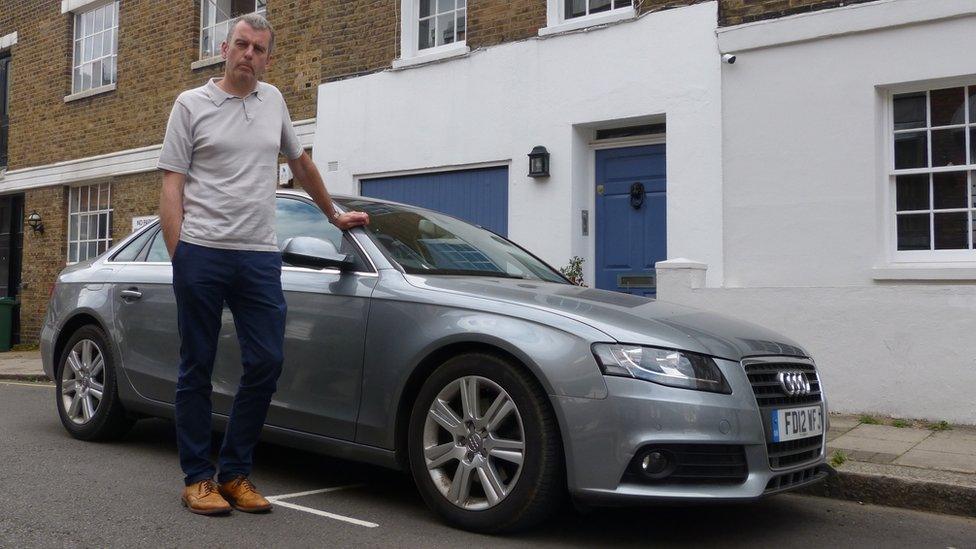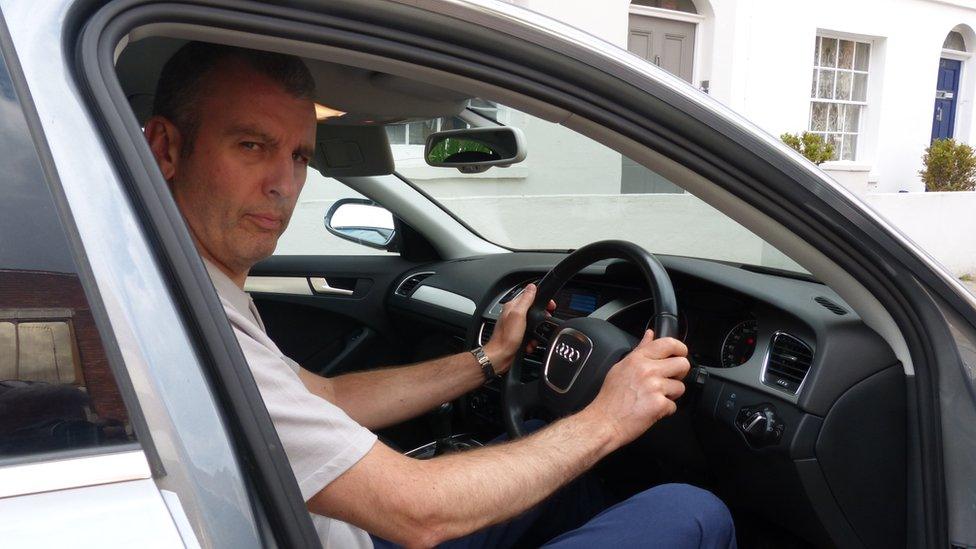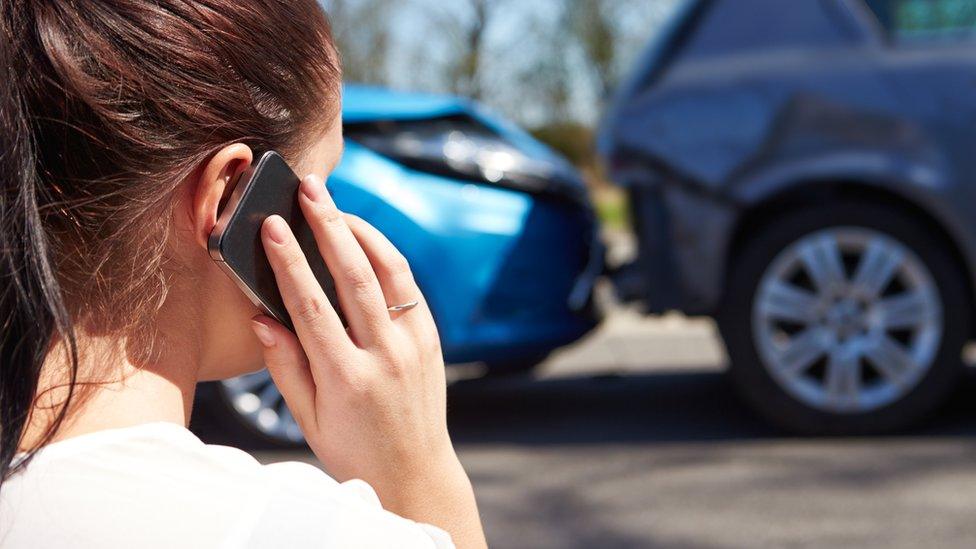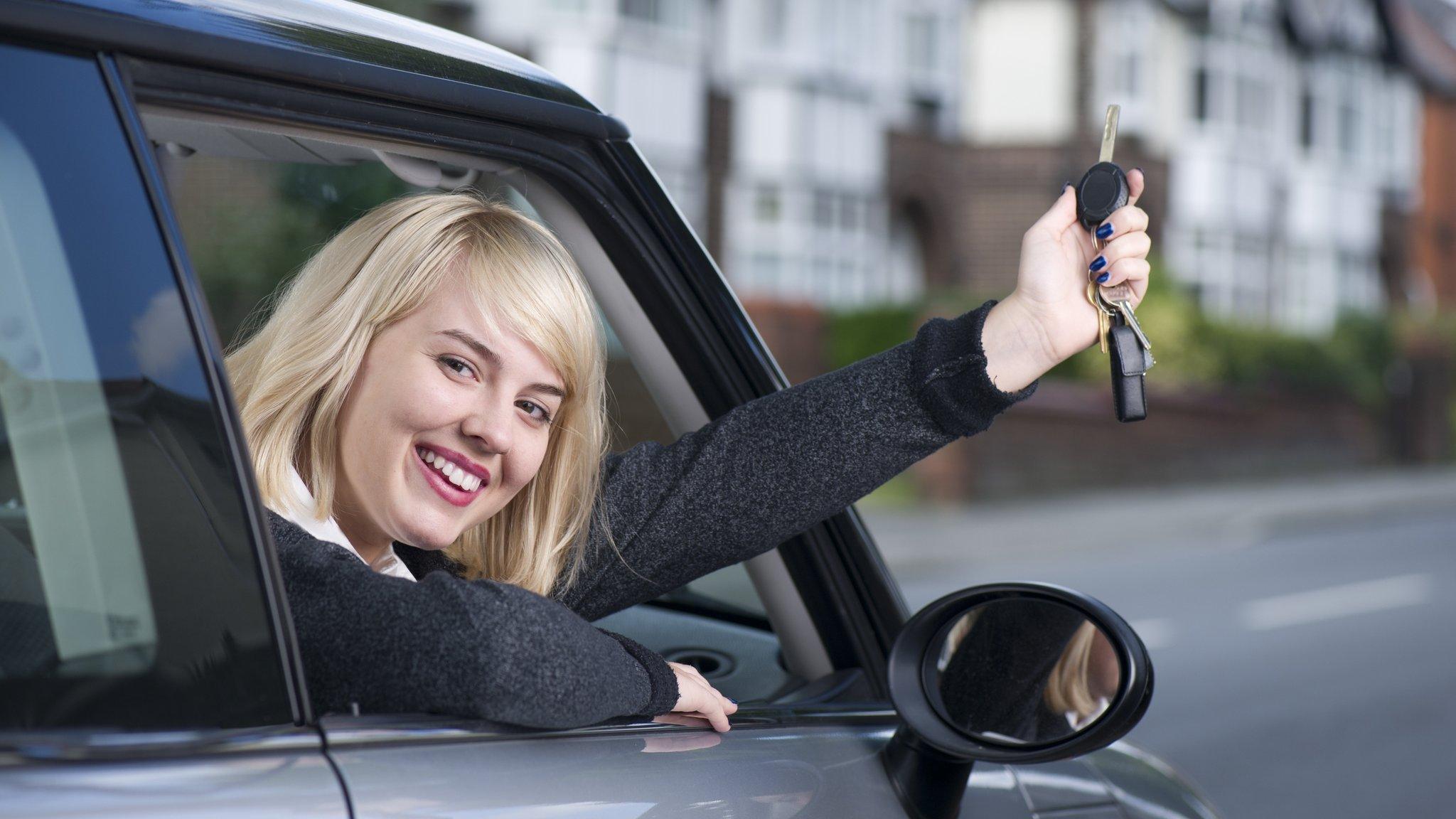Car insurance: Why pay when you are not driving?
- Published

John Leahy saves 20% on his car insurance
Look out of your living room window. Is your car parked in the street, or on your drive?
If so, you are probably paying to insure your car, even though you are not driving it.
In fact, many cars spend more than 90% of their time entirely static.
In times gone by that was tough luck for policy holders.
But now there are providers who can save you money if you don't drive every day.
Indeed new technology - "insuretech" as it is called - is starting to make insurance cheaper on everything from bicycles to golf clubs, jewellery to musical instruments.
Pay by the mile
One method of saving money is to pay by the mile.
John Leahy runs a record label in north London, and takes the Tube to work. As a result he drives only about 4,000 miles a year.
Rather than pay an annual premium upfront, he has a policy that is effectively pay-as-you-go.

John Leahy says he now thinks more about whether he really needs to drive somewhere
He reckons he will save between £100 and £150 this year, or around 20% of his annual premium.
He is also more aware of what each trip in the car really costs.
"I'm now of the mindset of thinking, 'Do I need to take the car?'
"Because not only will I be paying for the petrol, but I'll also be paying for the insurance."
How does it work?
This year Mr Leahy paid a fixed fee of £170, plus a £50 deposit. That covers him for fire and theft, and includes a black box that monitors his journeys.
Then he pays 3.4p for each mile he actually drives. At the end of each trip he gets a notification of the cost.
The firm that supplies his insurance - called By Miles - believes most people driving less than 7,000 miles a year are likely to pay less than they would with a conventional policy.
Typically that will be city-dwellers rather than those who live in the countryside.
"It gives you that flexibility to do a fair comparison before you start a journey - to say, 'Shall I walk it, shall I take the bus, or shall I take the train?'" says the company's chief executive James Blackham.
Pay by time
Another way to save money is to pay according to the time you spend driving. So you can now buy car insurance by the hour, the day, the week or the month.
This could be useful if you want to drive your partner's car, or give a friend a lift home from the pub.
But it is especially handy if you are a student, and perhaps want to drive your parents' car in the holidays.
Or, like 24-year-old musician Alfie Jeffries, if you only drive once in a while.

Musician Alfie Jeffries insures his van by the hour
He shares a van which he uses for the band.
"Sometimes I'll only need to go to a rehearsal, so I only need to insure it for a couple of hours," he says.
"Sometimes I don't know how long the rehearsal is going to be, so I'll insure it for an hour, and then whenever the rehearsal finishes, insure it for another hour to get back."
How it works
Having signed up, motorists send a picture of their driving licence, as well as a selfie with the car they want to drive.
Buying an hour's insurance costs roughly £10, with day cover costing between £20 and £30.
However, anyone who drives more than a couple of times each month is likely to find it cheaper to buy a conventional annual policy.
The firm that supplies this temporary insurance - called Cuvva - does not supply black boxes to monitor whether you have stopped driving by the time the cover expires.
That leaves them open to criticism that motorists may drive faster to get to their destination, or even continue driving without insurance.
"At the end of the day they're breaking the law if they're not insured, and people know that pretty effectively," says Freddy Macnamara, the chief executive.
Drivers get a 15-minute warning before the policy expires, and they can then pull over and extend the cover.
Crowd insurance
Technology also now makes it possible for people to club together for insurance.
A firm called Laka - named after the Hawaiian goddess of prosperity and hula dancing - puts cycling enthusiasts in groups of a thousand or so.
They pay nothing upfront. However, at the end of the month any claims are totalled up, and shared between the members.
In good months, when there are no claims, they will pay nothing. In bad months, when there are several claims, their liability is limited, meaning they might pay a maximum of £40 or so.

Rupert England saves money on his bike insurance
Rupert England is a keen cyclist who has seen the benefits.
Over the last six months he has paid just £22.50 in premiums, instead of £200 under a conventional policy.
"I love it. It's like the crowd insuring itself," he says.
"If somebody spends three or four grand on a bike, I know they'll take care of it. They're not the ones who are going to leave them around or abuse them. And for me there is a feeling that if there's a claim on the crowd, actually it is a genuine claim."
Golf 'clubs'
Tobi Taupitz, the founder of Laka, believes the traditional insurance model is outdated.
"There is a huge conflict of interest: the more insurers pay out in claims, the less profit they make. Customers want the opposite," he says.
"So the two parties have different interests, and I believe that is where the negative public perception of insurance companies is coming from."
His own firm covers high-end equipment belonging to hobbyists, who typically take care of their possessions.
He foresees policies becoming available for those who own expensive musical instruments, golf clubs or jewellery.
So if you need insurance, it now pays not just to shop around, but to consider more radical forms of cover as well.
- Published22 June 2018

- Published17 November 2017
